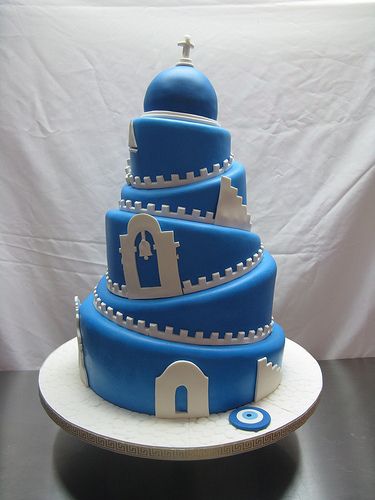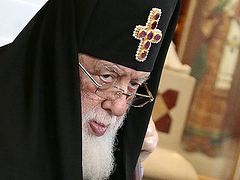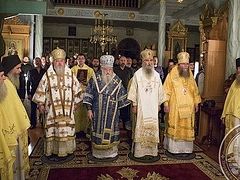 Photo: https://ru.pinterest.com/jimmye1212/greek-orthodox-wedding/
Photo: https://ru.pinterest.com/jimmye1212/greek-orthodox-wedding/ One priest was celebrating his birthday, which coincided with his name’s day. At the end of the Divine Liturgy that day he went out onto the solea, where the priests and parishioners had gathered to congratulate him on his personal celebration. Batiushka, with face radiant with joy, exclaimed the Paschal stichera: “This is the day which the Lord has made, let us rejoice and be glad in it…”
Indeed, a man’s birthday and name’s day are his personal little Paschas, his personal resurrection. And everyone around him, those close to him, those who love him, rejoice with him. After all, a whole universe was born; God created by His ineffable love an entire microcosm in His own image and likeness.
Sometimes people ask, “Why did the Creator create sinners, if He knew that the torments of hell await them all the same?” The answer, it seems to me, is that the torments of hell are still better than non-existence. What can be compared with the fact that the human soul knows itself as a personality and individuality, and enjoys being?
Therefore, of course, your birthday is a special day, when the world became better, more beautiful, kinder, because another unique person appeared in it—YOU.
Why is suicide the most serious sin? Because human life is a miracle. It is a great miracle of God! And to feel disgust towards it, or hatred, or the desire for destruction or a return to nothingness is the same, for example, as having disgust for a moth, for the beautiful crimson sunset or the gently-pink dawn. For God Himself. For love.
A man’s birthday is like the birthday of a shining supernova!
In this is expressed the great love of God, that He created out of nothingness a completely unique person, who has no equivalent.
And, of course, the main feeling we should have towards our birthday is that of gratitude towards God, our Creator, to our parents, and to life.
And best of all, in order to express this gratitude to God, we can confess and commune of the Holy Mysteries of Christ at the Liturgy. Have a Moleben of Thanksgiving served. Its climax is when the priest, before the throne of God, raises his hands upwards (this is always one of the most reverent and at the same time tense moments of any service) and solemnly proclaims: “Glory to Thee, O God, our Benefactor, unto the ages of ages.” And in this festive exclamation, full of reverent love, is something infinitely childlike and tender, addressed to our beloved heavenly Father. It is akin to the exclamation at Matins, “Glory to Thee, Who hast shone us the light.” And indeed, God has shown us the light.
You can read a special prayer known as “A Prayer on the Day of birth.” The prayer ends with beautiful and necessary words, in which the one celebrating his birthday beseeches, “O Lord, do Thou Thyself bless this year beginning for me and all the days of my life. Amen.” If we beseech God from a pure heart to help us in our life, then, of course, the Lord will send us His grace.
You can meet your name’s day [“тезоименитства”] in a similar way—that is the day of commemoration of the saint in honor of whom you were named in the Mystery of Baptism.
The Church Slavonic word “тезоименитство” (from “тезица”—equal, identical) denotes identical names, or being called by the same name. This saint is your heavenly protector, and he ever intercedes and prays before the throne of God for the salvation of your soul. He also guides and helps you in your earthly life. This is why the Church recommends every morning after completing the morning prayer rule to pray also to your saint, albeit briefly: “Pray unto God for me, O holy God pleaser N., for I fervently flee unto Thee, the speedy helper and intercessor for my soul.” On your name’s day, I think, it’s useful to also read the Akathist to your saint and heavenly protector. Your name’s day is often called your angel day. In the Church’s liturgical year there are two days when all Orthodox Christian celebrate their name’s day and angel day—the Sunday of All Saints, celebrated on the Sunday following Pentecost, and November 21 (new style), the day of the Synaxis of the Archangel Michael and the other Heavenly Bodiless Powers. Also there is one more positive thing about name’s days—we remember the day of our spiritual birth—that day, when we the Mystery of Baptism was celebrated over us. Indeed, the prayer for granting a name (in the Book of Needs the “Prayer at the Signing of a Child when it Receiveth a Name on the Eighth Day After its Birth”) is read before him.
Ultimately we must understand that the Lord carries us in His hands every day of our lives. He takes care of our surroundings, of our daily bread, of our safety and protection from evil spirits and many other things we don’t yet understand.
And happy is that man whose life becomes a hymn, a laudatory psalm of praise to God—our loving Father. Such a man, in fact, beseeches the Lord for but one thing: that he not by his own lawlessness break away from or fall out of His warm hands, but to stay in them, fully surrendering himself to the will of God. The Lord will bear us into yet greater blessedness in the heavenly city of New Jerusalem, where will be neither pain, nor tears, nor despair, but a pure river of water of life, clear as crystal, proceeding out of the throne of God and of the Lamb (Rev. 22:1).
As we were created from non-existence for eternal life, we inscribe in our hearts, with the help of God, these great and beautiful words: This is the day which the Lord has made, let us rejoice and be glad in it.
And may this true Paschal joy be kindled in the heart of every celebrant!




==============================
God does not create sinners, He creates men who choose to sin.
To avoid that those sinners ended up in the torments they chose, God had two possibilities:
1) to create slaves, creatures not in his image, unable to sin because deprived of freedom in their will.
2) to abstain from creating us at all.
What is better?
What good are slaves for the Almighty, He Who has and can everything?
What good are no creatures at all?
As for the torments of Hell being preferable to non-existence, I would leave the answer to someone who has experienced them.